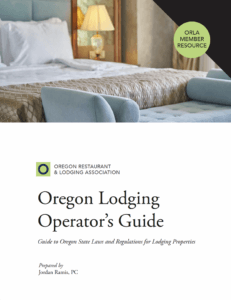Compliance & Regulations
Hospitality Industry Compliance & Regulation Info
Resource Hub: Essential information on key compliance topics for hospitality operators. While not exhaustive, it provides guidance on staying aligned with important state and federal laws. See also our FAQ page.
Quickly jump to:
ADA Compliance
Updated ADA standards cover mobility devices, service animals, facilities, and online reservation systems. Hospitality businesses should ensure these areas meet current requirements and review existing features for compliance with today’s stricter guidelines.
Service Animals: Under the ADA, businesses that serve the public generally must allow service animals to accompany people with disabilities in all areas of the facility where the public is normally allowed to go. Visit the ADA website for more information.
- ORLA's Boiled Down podcast #44: "A Miniature Horse Walks Into a Bar"
- Blog Post: The Law Regarding Service Animals and Public
- Service Animal Policy poster for Restaurants
- Service Animal Policies & Agreement form for Restaurants
- Service Animal Policy poster for Lodging Properties
- Service Animal Policies & Agreement form for Lodging Properties
Swimming Pools and Spas: As of 2013, pool and spa accessibility under the ADA implemented a pool lift requirement. Visit the ADA website or the ADA Accessibility Requirements for more information.
Online Reservation Systems: Hotels must ensure their online reservation systems allow guests with disabilities to book accessible rooms with the same ease as other guests—including selecting specific room types and reservation times. Updated regulations are outlined in 28 C.F.R. § 36.302(e), available on the ADA website.
Carbon Monoxide Requirements
Oregon requires carbon monoxide (CO) alarms or detection systems in all Group R occupancies. As of the 2018 International Fire Code (adopted by Oregon), hotels must have monitored CO detectors—not just standalone alarms—in areas with fuel-fired appliances (e.g., boiler rooms, kitchens, laundries, generator rooms, or rooms with fireplaces). This rule is retroactive. Refer to Oregon Fire Code 908.7.2.
Oregon Indoor Clean Air Act (ICAA)
Also known as the Smokefree Workplace Law, the ICAA bans smoking indoors at workplaces and within 10 feet of entrances, exits, accessibility ramps, windows, and air intake vents.
Learn more at Oregon.gov.
CBD & Alcohol in Food and Beverage
As of December 19, 2019, the OLCC prohibits the sale of manufactured products that mix CBD and alcohol. Additional rules are being developed to ban bars and restaurants from adding CBD to alcoholic drinks.
Visit the OLCC website for the CBD FAQ, guidance, and infographics.

Food Waste Prevention, Donation & Composting
Metro’s Food Waste Stops With Me initiative helps businesses cut food waste through prevention, donation, and composting. As of 2023, businesses in Washington, Multnomah, and Clackamas counties generating over one 60-gallon cart of food scraps per week must separate food scraps from landfill waste.
Learn more about reducing food waste.
Licensing & Permits for Restaurants and Lodging
If you plan to open or operate a restaurant or lodging facility, you'll need to apply for the proper licenses through your Local Public Health Authority.
Required Workplace Postings
Oregon employers must display certain state and federal workplace notices. This includes the Paid Leave Oregon model notice, which must be posted at each work site and shared electronically or by mail with remote employees. Download required posters from BOLI.
Oregon Paid Leave
Oregon’s Paid Family and Medical Leave Insurance (PFMLI) program launched on January 1, 2023. It’s funded by both employer and employee contributions. Employers with fewer than 25 employees are exempt from contributing, but their employees must still participate. All employers must either join the state program or offer an approved equivalent plan.
ORLA created a 1-pager on Paid Leave; see also:
PFML FAQ
Q: Do Seasonal Employees Count Toward Employer Size?
A: Yes. Under current rules (OAR 471-070-3160), employer size for Oregon Paid Leave is based on the average number of employees reported over the last four quarters. This includes full-time, part-time, seasonal, temporary, and out-of-state workers.
Employers calculate their average by adding the total employee count from each quarterly payroll report and dividing by four.
Phone Systems (RAY BAUM’S Act) & 911
Effective January 6, 2021, the RAY BAUM’S Act requires that any newly installed phone system must transmit detailed location info—such as room, floor, or building number—to 911 call centers (PSAPs), in addition to the business address. This applies to all phones, including those in common areas and staff use. If possible, systems should also provide a direct callback number for the phone that placed the 911 call.
Note: Phone systems installed before Jan. 6, 2021, are exempt from this requirement, similar to Kari’s Law exemptions for systems installed before 2020.
For more information, visit the FCC website.

Plastic Straws, Bags & Reusables: Restrictions
In 2019, Oregon lawmakers passed key legislation to reduce single-use plastic waste:
- Plastic Straws (SB 90): Food and beverage providers may only offer single-use plastic straws upon request. This applies to restaurants, convenience stores, and similar establishments.
- Plastic Bag Ban (HB 2509B): Retailers are prohibited from providing single-use checkout bags, with some exceptions:
- Restaurants may offer recycled paper bags at no cost.
- Customers using an EBT card may receive reusable plastic bags for free.
- Violations can result in fines up to $250 per day.
- A "single-use checkout bag" is defined as any bag provided at checkout that is not a recycled paper, reusable fabric, or durable plastic bag.
- Reusable Containers(SB 545, 2023): Customers can bring their own containers to participating restaurants, food carts, and other retail food establishments when purchasing food, grabbing to-go orders or packing up leftovers. See Metro's fact sheet, Choose to Reuse.
- Polystyrene Ban (SB 543, 2023): Oregon recently banned food businesses from using polystyrene foam - commonly known as Styrofoam - food and drink containers.
Wage & Hour Compliance
The U.S. Department of Labor’s Wage & Hour Division (WHD) enforces key federal labor laws—including minimum wage, overtime, and youth employment standards under the Fair Labor Standards Act (FLSA). Retail, grocery, and restaurant employers in Oregon are seeing a rise in WHD investigations and penalties—especially related to child labor and overtime violations.
Questions? Call the WHD Helpline at 866.487.9243 or Portland District Office at 503.326.3057.
Visit the U.S. DOL Wage & Hour Division for more tools and up-to-date information.
FLSA Fact Sheets:
- Fact Sheet #22: Hours Worked under the FLSA
- Fact Sheet#21: Record Keeping under the FLSA
- Fact Sheet #23: Overtime Pay Requirements of the FLSA
- Fact Sheet #45: Hotel and Motel Establishments Under FLSA
- Fact Sheet #2: Restaurants and Fast Food Establishments under the FLSA
- Fact Sheet #15: Tipped Employees Under the FLSA
- Fact Sheet #2A: Employing Youth in Restaurants
- Fact Sheet #40: Overview of Youth Employment (Child Labor Provisions)
Workplace Immigration Law: Be Prepared
Immigration enforcement activity is increasing in cities across the U.S., including surprise visits from Immigration and Customs Enforcement (ICE).
What Employers Should Do:
- Audit I-9 forms regularly for accuracy and compliance
- Verify employment documentation and maintain proper records
- Establish response protocols in case of an ICE inspection or raid
Both the American Hotel & Lodging Association (AHLA) and National Restaurant Association (NRA) continue to monitor immigration policy updates and provide guidance to help hospitality businesses stay informed and compliant. Available resources:
- Sign up for free "Know Your Rights" Trainings (Oregon Justice Resource Center)
- Webinar: Workplace Immigration Law in 2025 - What Restaurants Should Expect (National Restaurant Assn., Feb. 2025)
- Workplace Immigration Law: What Restaurants Should Expect (National Restaurant Assn., Jan. 2025)
- A Guide for Employers: What to Do if Immigration Comes to Your Workplace (National Immigration Law Center)
- 5 Steps for Employers to Prepare for Anticipated Raids and Deportations (Fisher Phillips, Nov. 2024)

